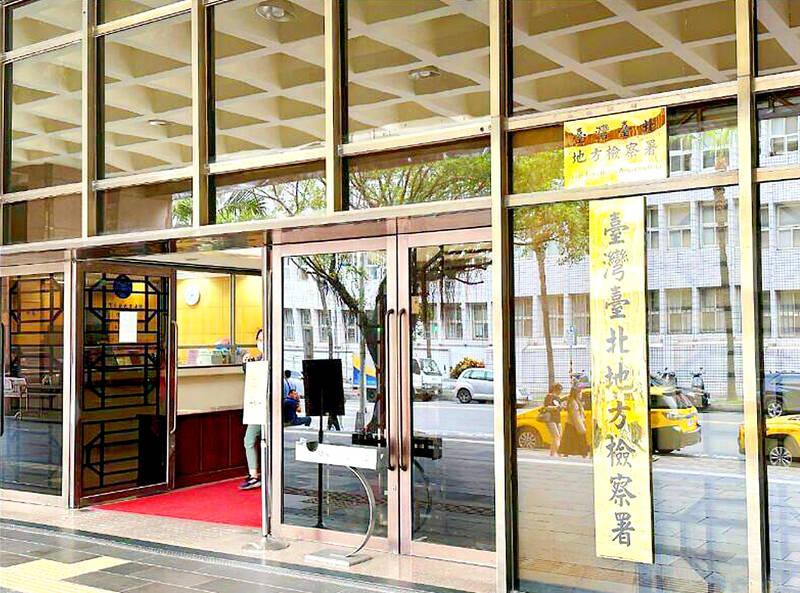The Taipei District Prosecutors' Office this morning released Lin Yueh-lung (林岳龍) on bail of NT$100,000 and barred him from traveling abroad over alleged involvement in a Chinese espionage case.
Lin served as assistant to several Chinese Nationalist Party (KMT) legislators, including Wang Hung-wei (王鴻薇), Hsu Yu-chen (許宇甄) and Lin Chien-chi (林倩綺).

Photo: Taipei Times
His most recent post was as a part-time social media manager for KMT Taipei City Councilor Wang Hsin-yi (王欣儀), and as a spokesperson for the KMT's Taipei chapter.
Codefendants Wang Kai-min (王凱民), former aide to KMT Keelung City Councilor Lan Min-hui (藍敏輝), and Kuo Wen-pin (郭文彬), former senior executive officer in the Presidential Office under then-president Chen Shui-bian (陳水扁), were released without bail.
Lin is suspected of having been recruited by Chinese authorities several years ago.
Prosecutors said he allegedly received payments and provided confidential and sensitive information to the Chinese Communist Party.
The case is being investigated as a possible breach of the National Security Act (國家安全法).
Prosecutors added that the investigation has also implicated Wang Kai-min and Kuo in the case.
Prosecutors yesterday conducted raids at seven locations, including the residences of Lin Yueh-lung and offices of Wang Hsin-yi and Lan.
They also summoned Lin Yueh-lung, Wang Kai-min and Kuo for questioning.
Wang Hsin-yi released a statement last night pledging full cooperation with the investigation to protect national security.
The statement added that Lin Yueh-lung was hired as a part-time social media manager in January and does not work in the councilor's office.
Also last night, Lin Yueh-lung's former legislative employers issued statements expressing support for prosecutors' lawful investigation into suspected criminal behavior.
Lin Chien-chi said that Lin Yueh-lung did not handle any secret or confidential information during his employment in her office.

The Coast Guard Administration (CGA) yesterday said it had deployed patrol vessels to expel a China Coast Guard ship and a Chinese fishing boat near Pratas Island (Dongsha Island, 東沙群島) in the South China Sea. The China Coast Guard vessel was 28 nautical miles (52km) northeast of Pratas at 6:15am on Thursday, approaching the island’s restricted waters, which extend 24 nautical miles from its shoreline, the CGA’s Dongsha-Nansha Branch said in a statement. The Tainan, a 2,000-tonne cutter, was deployed by the CGA to shadow the Chinese ship, which left the area at 2:39pm on Friday, the statement said. At 6:31pm on Friday,

The Chinese People’s Liberation Army Navy’s (PLAN) third aircraft carrier, the Fujian, would pose a steep challenge to Taiwan’s ability to defend itself against a full-scale invasion, a defense expert said yesterday. Institute of National Defense and Security Research analyst Chieh Chung (揭仲) made the comment hours after the PLAN confirmed the carrier recently passed through the Taiwan Strait to conduct “scientific research tests and training missions” in the South China Sea. China has two carriers in operation — the Liaoning and the Shandong — with the Fujian undergoing sea trials. Although the PLAN needs time to train the Fujian’s air wing and

Taiwanese celebrities Hank Chen (陳漢典) and Lulu Huang (黃路梓茵) announced yesterday that they are planning to marry. Huang announced and posted photos of their engagement to her social media pages yesterday morning, joking that the pair were not just doing marketing for a new show, but “really getting married.” “We’ve decided to spend all of our future happy and hilarious moments together,” she wrote. The announcement, which was later confirmed by the talent agency they share, appeared to come as a surprise even to those around them, with veteran TV host Jacky Wu (吳宗憲) saying he was “totally taken aback” by the news. Huang,

The American Institute in Taiwan (AIT) put Taiwan in danger, Ma Ying-jeou Foundation director Hsiao Hsu-tsen (蕭旭岑) said yesterday, hours after the de facto US embassy said that Beijing had misinterpreted World War II-era documents to isolate Taiwan. The AIT’s comments harmed the Republic of China’s (ROC) national interests and contradicted a part of the “six assurances” stipulating that the US would not change its official position on Taiwan’s sovereignty, Hsiao said. The “six assurances,” which were given by then-US president Ronald Reagan to Taiwan in 1982, say that Washington would not set a date for ending arm sales to Taiwan, consult